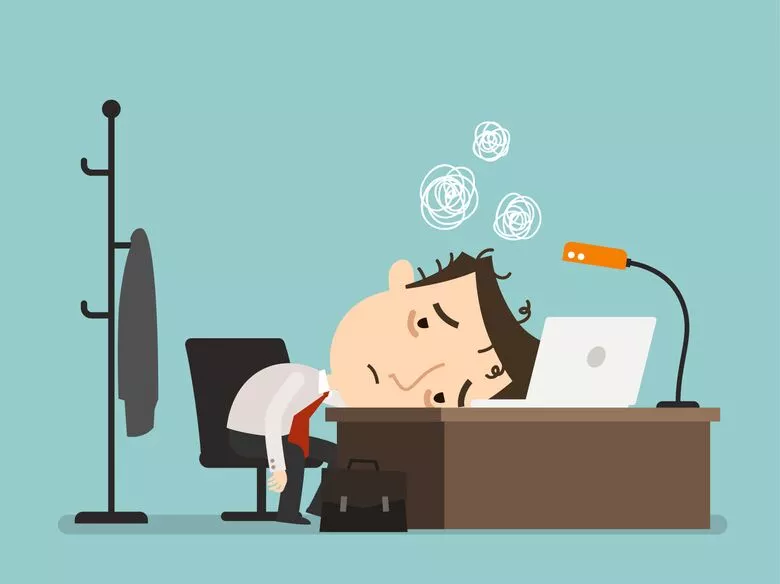Do you feel like you’re constantly under pressure at work? Do you find yourself constantly stressed out, no matter what you do? You’re not alone. Work stress is a major problem in today’s society, and it can also have serious consequences for your health if left unchecked. In this blog post, we will discuss the truth about work stress and how to further deal with it effectively.
Defining Work Stress
 Stress is a natural response of the body to any demand placed on it. When we feel stressed, our bodies release hormones like adrenaline and cortisol, which prepare us to deal with the situation at hand. This is known as the “fight-or-flight” response, and it’s a perfectly normal reaction to stress.
Stress is a natural response of the body to any demand placed on it. When we feel stressed, our bodies release hormones like adrenaline and cortisol, which prepare us to deal with the situation at hand. This is known as the “fight-or-flight” response, and it’s a perfectly normal reaction to stress.
However, when this response is constantly triggered by everyday work tasks, it can lead to serious health problems. Work stress is defined as “the harmful physical and emotional responses that occur when the requirements of the job exceed the capabilities, resources, or needs of the worker.” In other words, work stress occurs when we feel like we’re not able to cope with the demands of our job.
It’s important to note that even if you love your job, you can still experience work stress. No job is perfect, and there will always be some element of stress involved. However, if you’re constantly feeling overwhelmed by your work, it’s time to take a closer look at the situation and see if there are ways to reduce your stress levels.
Signs
Stress manifests itself in various ways. Some people may experience physical symptoms, while some may experience changes in their cognition and emotions.
Physical signs:
- Headaches
- Muscle tension or pain
- Chest pain
- Excessive sweating
- Hair loss
- Upset stomach
- Fatigue
Emotional/mental signs:
- Anxiety
- Depression
- Guilt
- Anger
- Loneliness
- Loss of motivation
- Withdrawal
Cognitive signs:
- Constant worry
- Difficulty concentrating
- Brain fog
- Procrastination
- Indecisiveness
- Decrease in creativity
- Memory loss
- Irritability
All these signs are valid indicators that you may be experiencing work stress. If you find yourself exhibiting any of these symptoms, it’s important to take action and find a solution.
Causes
 A workplace can be a dynamic and demanding environment that can lead to stress. Some common causes of work stress include instances such as:
A workplace can be a dynamic and demanding environment that can lead to stress. Some common causes of work stress include instances such as:
- Unrealistic deadlines: Trying to meet an unrealistic deadline can be extremely stressful. If you’re constantly being asked to do more than is humanly possible, it’s time to have a discussion with your boss about setting more realistic expectations.
- Excessive workloads: An excessive workload is one of the most common causes of work stress. This happens when you’re given more tasks than you can reasonably complete in the time allotted. If you find yourself constantly working overtime, it’s time to speak up.
- Working long hours: A typical work-day is usually eight hours long. However, in some cases, you may be expected to work longer hours. This can be extremely stressful, especially if you have other responsibilities outside of work.
- Lack of control over the work situation: Feeling like you don’t have any control over your work can be very stressful. If you’re always being given new tasks with no input on how to complete them, it’s time to ask for more guidance from your superiors.
- Inadequate resources: If you’re not given the proper resources to complete your work, it can be very stressful. If you find yourself constantly having to improvise or make do with what you have, it can cause a lot of unnecessary stress.
- Conflict with co-workers or boss: Office politics and conflict with co-workers or your boss can be a major source of stress. This can manifest as either interpersonal conflict or simply feeling like you do not get any appreciation for your work. If you’re constantly at odds with those around you, it’s time to have a discussion with your boss about the situation.
- Job insecurity: This is one of the most stressful situations you can find yourself in at work. If you’re constantly worrying about losing your job, it can take a toll on your mental and emotional health. Because one always feels on edge or anxious about possibly being let go, it can be difficult to concentrate on work tasks.
- Financial instability: This is another stressful situation that can be caused by work. If you’re not being paid what you’re worth, it can cause a lot of financial stress. This can also happen if you’re worried about being able to afford your lifestyle on your current salary.
- Work-life balance: Lastly, the workplace isn’t only about work. It’s also important to have a healthy balance between work and the rest of your life. If you’re working too much and not taking enough time for yourself, it can further lead to a lot of stress.
These are just some of the many causes of work stress. If you’re constantly feeling stressed at work, it’s important to identify the root cause so you can find a way to deal with it effectively.
Consequences
If left unchecked, work stress can have serious consequences for your health.
Physical effects include:
- High blood pressure
- Heart disease
- Obesity
- Diabetes
- Musculoskeletal problems
- Sleep disorders
Mental effects include:
- Anxiety disorders
- Sleeping problems
- Depression
- Isolation/withdrawal
- Acute stress disorder
- Alcohol or substance abuse
Cognitive effects include:
- Decreased productivity
- Trouble concentrating
- Absenteeism
- Procrastination
- Forgetfulness
- Making mistakes
All of these are some ways that work stress can have a negative impact on your health. It’s important to find ways to deal with work stress so it doesn’t get out of hand.
Tips To Manage
Assuming that you cannot eliminate the stressors at your workplace, here are some tips on how to deal with work stress:

- Recognize the signs: The first step is to be aware of the signs of stress. If you’re constantly feeling overwhelmed or anxious, take a step back and assess your situation. Are there certain tasks that are causing you more stress than others? Is there a particular time of day when you feel more stressed? Once you identify the sources of your stress, you can start to find solutions.
- Speak to HR: Human resources department can be a great resource when it comes to dealing with work stress. If you’re feeling overwhelmed, they may be able to offer guidance or help you find a solution. You may even ask them to implement an EAP program for everyone’s betterment.
- Take a break: When you’re feeling stressed, take a few minutes to yourself to relax and rejuvenate. You do not necessarily have to take a long vacation, but even a short break can do wonders for your mental health.
- Set a reward system: The human mind works on positive reinforcement. Set a goal for yourself and once you achieve it, treat yourself with something you wanted. This will help you stay motivated while also reducing stress.
- Form bonds with co-workers: Strong social support is essential for managing stress. If you have a good relationship with your co-workers, they can provide a listening ear and help you find solutions to your problems.
- Establish boundaries: In order to not let work stress make its way into your personal life, establish boundaries between work and home. When you’re at work, focus on work tasks and leave your personal life at home. This will further help you maintain a healthy work-life balance.
- Practice self-care: Last but not the least, it is important to take care of yourself both physically and mentally. Eat healthily, exercise regularly, and get enough sleep. You may also indulge in activities that make you happy and help you relax.
Work stress is a common issue that many people face on a daily basis. While it may seem impossible to eliminate, there are ways to manage it effectively. By following the tips above, you can learn how to better deal with work stress and lead a more productive and balanced life.
Conclusion
Conclusively, we can say that work stress is a serious matter. It can have harmful consequences on your health, both mental and physical. It can arise from various causes and it is important to identify the source of your stress. Once you do, you can start finding ways to deal with it effectively.
If you or someone you know is looking for psychological help, Therapy Mantra is here for you. We are the leading providers of online therapy and counseling. Our team of highly trained and experienced therapists can provide assistance at the most affordable rates. Contact us today to learn more about our services. You may also visit our website to book an online therapy session or download our free Android or iOS app for more information.


